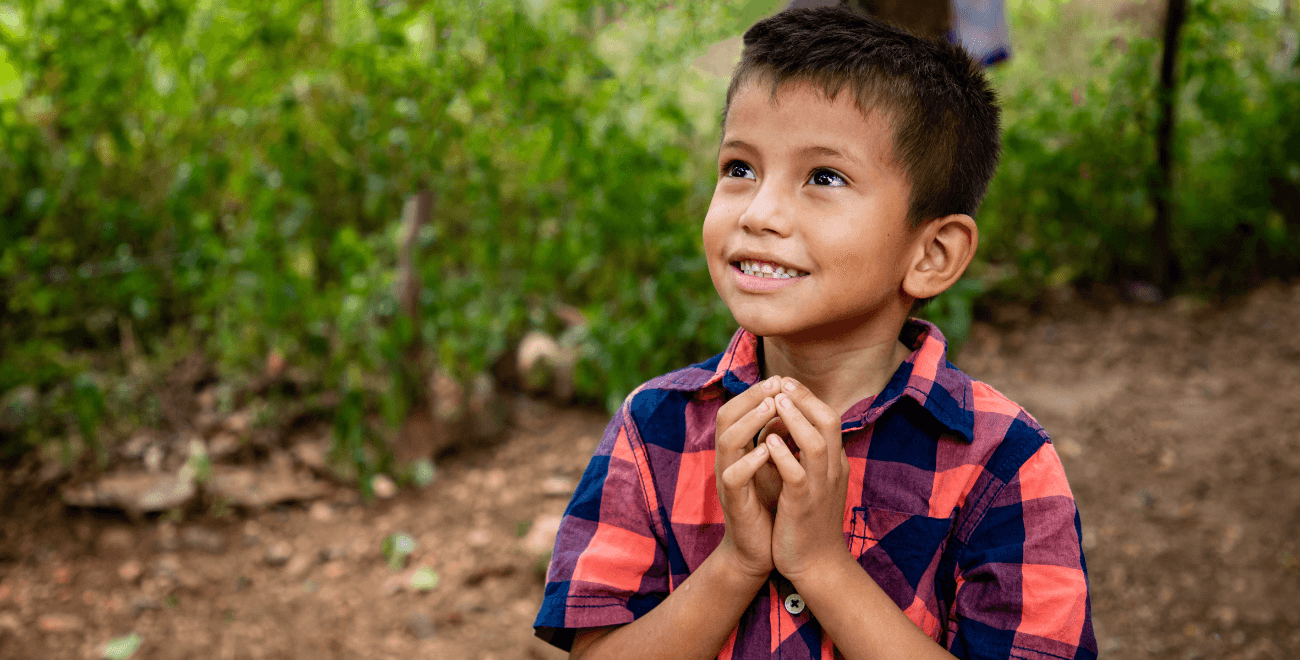Hope bringers: How Compassion is changing lives
Deputy Editor for Premier Christianity magazine, Megan Cornwell, went to see for herself exactly what ‘releasing children from poverty in Jesus’ name’ looks like. Here, she shares her experience.

Guavas, bananas, sugar cane, beans, papayas the size of your head. One by one, Sula places the ripe harvest in front of us in bowls. He’s offering it as a gift, but I see it as a symbol of what God has done in his life.
I’m in hot, humid Uganda, where Sula lives down a dirt track and past dense fields of matoke trees. There’s no tarmac road to follow and, in the rainy season, the terracotta-coloured earth slides into a thick sludge that is impossible to navigate. The only way to get there is by foot, or on the back of the infamous boda boda motorbike taxis that buzz along the main roads in and out of the capital city, Kampala. It takes Sula and his six-year-old daughter, Immaculate, around half an hour to walk to school each day.
Sula instinctively understands the value of education, despite not being able to read or write until recently. So, instead of insisting his daughter stays home to mother her younger siblings, or help grow the crops that feed the family, they faithfully walk to the Baale Child Development Centre each and every day.
In Uganda, there is a state programme for primary education, but parents expect to pay a stipend, as well as supplying books and uniforms for their children. This is prohibitively expensive for the 42 percent of the population living below the poverty line on an income of less than $2 a day.
POVERTY IS MORE THAN WHAT YOU CAN SEE OR WHAT YOU DON’T HAVE, IT’S A CONDITION OF THE HEART.

For Immaculate’s family, however, this financial strain doesn’t exist, because Compassion covers the cost. It means Immaculate can join her friends from the village to learn how to read and write – and, one day, this education will help her break free from the shackles of poverty that have held her family hostage for generations.
THE HOPE OF THE WORLD
Since 19801, Compassion has seen 125,900 Ugandan children released from poverty in Jesus’ name. Currently, only 26 percent of children in the country complete secondary education so, despite Compassion’s impressive track record, there are still many yet to be reached. Immaculate was selected for the Baale programme2 because her family scored high on the poverty index, placing her in the demographic of greatest need.
The school she attends is on the site of her local church, which is how Compassion runs all its projects3 – through faithful Christians on the ground. This means that alongside maths, hygiene classes and English, Immaculate is learning that Jesus loves her. In many ways, this is the most important lesson of all.
Jesus’ love is a powerful message that we sometimes take for granted in the West, where we are full up from other things. In Uganda – where, for many, material circumstances say otherwise – it can be harder to grasp. But once this simple truth sinks in, it changes everything. Poverty is more than what you can see or what you don’t have, it’s a condition of the heart. It is a lie that whispers: You are nothing. This is how things will always be. But the message of the gospel cuts through that voice to declare life and hope, pulling even the most desperate to solid ground. There is a way, there is a better day coming.

Compassion might be a Christian development charity, but really, they are hope-bringers. Through the local church, they lift children – who would otherwise be kept low – into positions of authority and influence. One by one, these little children are changing the world.
Among the illustrious former alumni of Compassion is an anti-corruption officer in the Ugandan government, a real-estate mogul building affordable homes for the next generation and a famous singer with celebrity influence. All of them are passionate Christians, sharing the reasons for their hope in the rooms God has placed them in.
You can read Premier’s full article here.
We’re delighted to partner with Premier to share about Compassion’s ministry, as we work in partnership with local churches around the world. And we’re grateful to all the supporters who’ve joined us thanks to listening to Premier radio and reading Christianity magazine.

Learn more about how to sponsor a child, bringing hope for a whole family.
Footnotes
1980 is when Compassion began church partnerships in Uganda. Compassion originally started in 1952 in South Korea. You can read about the history of Compassion here.
Baale is a local church partner that runs one of Compassion’s projects.
Compassion projects provide tutoring classes to complement children’s schooling. Sponsored children might attend their project at the end of their school day, or on Saturdays. They receive educational support to meet their specific needs. Many countries charge school fees and require families to buy uniforms and school supplies – sponsoring a child enables families to cover these costs.
Words by
Megan Cornwell
Share:
Share:
Pray with us
Join thousands of people praying to end poverty, take action through our appeals and activities, and be inspired by how God is changing lives.
Get a little Compassion in your inbox with our Prayer and Stories email.
Remember, you can unsubscribe at any time. Please see our Privacy Policy for more information.
